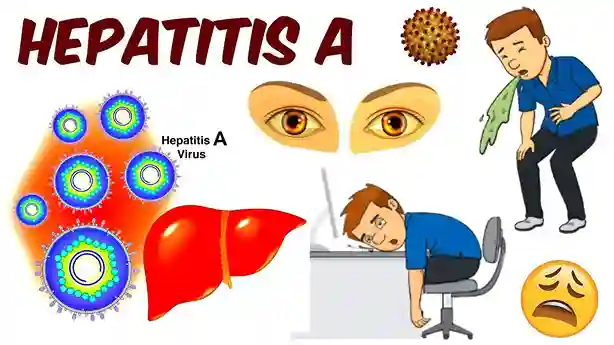Hepatitis A
Hepatitis A is a liver infection caused by a virus from the feces of an infected person. Symptoms are usually not serious and most people recover completely within a few months.
In rare cases, the disease can be life-threatening due to the liver not being able to function properly. The transmission of the disease can occur due to consuming food and drinks that have been contaminated by the feces of sufferers.
This disease can also be transmitted through direct contact with an infected person. One way to protect yourself from exposure to the virus is by getting vaccinated.
Symptoms of Hepatitis A
Not everyone who is infected with hepatitis A has symptoms. Adults are more likely to have symptoms than children.
If symptoms occur, they usually begin to develop about 4 weeks after a person is infected and can last for several months.
Symptoms of hepatitis A include:
- Excessive tiredness.
- Joint and muscle pain.
- Increase in body temperature.
- Decreased appetite.
- Experiencing pain in the upper right side of the abdomen.
- Having jaundice.
- Changes in the color of urine or feces to become darker.
- Itching of the skin.
Causes of Hepatitis A
The cause of hepatitis A is a viral infection that infects liver cells and causes inflammation. Inflammation can affect how the liver works, so a number of symptoms can appear.
So, how is hepatitis A transmitted? This disease is not spread through sneezing or coughing, but rather through consuming contaminated food or drink.
Here are some specific ways this type of hepatitis virus spreads :
- Consuming food that has not been processed properly, for example without washing your hands first.
- Consuming food and drinks that have been contaminated by the sufferer’s feces.
- Eating raw shellfish from water that has been contaminated with sewage
- Interacting with a sufferer or someone who has symptoms.
- Having sexual intercourse with someone who has the infection.
Risk Factors
A person who has not been vaccinated is at high risk of being exposed to the virus. Most cases occur in children and some people with the following risk factors:
- Traveling or working in areas with high rates of hepatitis.
- Work or leave your child at daycare.
- Living with a sufferer.
- Having sexual relations with the same sex.
- HIV positive.
- Having a blood clotting factor disorder, such as hemophilia.
- Using any type of illegal drugs or narcotics.
Diagnosis of Hepatitis A
To diagnose this disease, the doctor will ask about the symptoms you are experiencing.
In addition, the doctor will also ask about your family’s medical history. If the doctor suspects signs of jaundice, a blood test will be performed.
Blood tests aim to check liver function and detect the presence of antibodies related to the virus that causes it.
In addition, the doctor can also perform other additional examinations.
Such as blood cell counts, abdominal ultrasound, and antibody tests for hepatitis B or hepatitis C. The goal is to find out if jaundice is caused by another condition.
Please remember, if Hepatitis A Symptoms Make You Worried, Consult This Doctor Immediately to Get the Right Treatment.
Hepatitis A Treatment
This disease does not have any special treatment steps, because the immune system will eliminate the virus by itself.
The hepatitis A treatment steps you undergo are only aimed at alleviating the symptoms you are experiencing.
If you are feeling unwell, here are some things you should do:
- Get plenty of rest.
- Take painkillers, such as ibuprofen and paracetamol.
- Pay attention to the living environment. Make sure it has good ventilation for air circulation.
- Reduce symptoms of nausea and vomiting by consuming light foods or fruits.
- Avoid alcohol consumption.
- Do not have sexual intercourse until the specified time.
- Implement good hygiene measures, such as washing your hands frequently.
In addition to medical treatment, there are some lifestyle changes that sufferers need to make.
Prevention of Hepatitis A
The main prevention of this disease is vaccination. Vaccines are usually necessary for those at high risk of contracting this disease, for example:
- Sanitation worker.
- Toilet cleaner.
- People who are sexually active.
- People with chronic liver disease.
In addition, you can also prevent hepatitis A by maintaining cleanliness, namely:
- Wash your hands regularly, with running water and soap. Especially before eating, before preparing food, and after going to the toilet.
- Do not share personal items with others. Such as toothbrushes or towels, including eating utensils.
- Cook food until done and boil water until boiling.
Complications of Hepatitis A
Sufferers usually recover from the disease without complications. However, about 10 percent of sufferers experience a relapse of the disease. Don’t worry, most people who relapse can recover completely.
Complications are rare, but this infection can lead to fulminant hepatitis.
This is a form of acute hepatitis that can lead to liver failure. The risk of death from fulminant hepatitis increases with age.
It is important to note that liver failure is more common in adults over the age of 50 and in people with other liver diseases, such as cirrhosis or liver fibrosis.
When to See a Doctor?
Immediately check yourself at the nearest hospital if you experience a number of the symptoms mentioned.
Get a hepatitis vaccine or an immunoglobulin (antibody) shot within two weeks of suspecting exposure to the virus.

